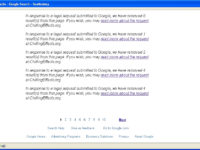Last month’s Supreme Court of Canada decision upholding a global takedown order requiring Google to remove search results on an international basis sparked widespread concern from civil liberties and digital rights groups who fear the implications for freedom of expression online (the case was celebrated by IP rights groups who now envision using Canada as the base for global takedowns). My initial post on the decision argued that the Court had failed to grapple with the elephant in the room, namely the broader implications of global takedowns and the likelihood of conflicts:
The Supreme Court of Canada did not address the broader implications of the decision, content to limit its reasoning to the need to address the harm being sustained by a Canadian company, the limited harm or burden to Google, and the ease with which potential conflicts could be addressed by adjusting the global takedown order. In doing so, it invites more global takedowns without requiring those seeking takedowns to identify potential conflicts or assess the implications in other countries.
The prospect of global conflicts has now come to the Equustek case with Google filing suit in a federal court in California asking the court to block enforcement the Canadian order on the grounds that it violates the U.S. constitution and federal laws.











